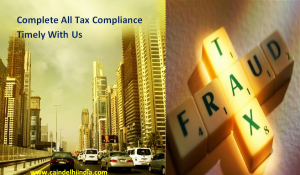CORPORATE AND PROFESSIONAL UPDATES JULY 4, 2016
Today updates:

DIRECT TAX:
Income Tax : Mumbai ITAT allows Sec.11 exemption on profits earned by assessee hospital from pharmacy business for AY 2006-07, upholds assessee’s claim that pharmacy business was an integral part of hospital business; [TS-350-ITAT-2016(Mum)]
Income Tax : ITAT: Retention bonus for arresting employee attrition deductible as revenue expenditure [TS-349-ITAT-2016(DEL)]
Income Tax: Transfer-fees from outgoing member not taxable for co-operative housing society applying ‘mutuality’ [TS-346-HC-2016(BOM)]
CBDT issued 3rd clarification in the form of FAQs on the Income Declaration Scheme, 2016 Vide Circular No. 25 of 2016 dated 30.06.2016 Under the ‘Income Declaration Scheme’ tax of forty-five per cent of such undisclosed income is there. The IDS is effective from June 1, 2016 and will remain open up to September 30, 2016. The declarant is required to pay tax up to November 30, 2016. In the recent FAQs issued on June 30, 2016 the CBDT has clarified that once the person had declared undisclosed income, no question will be asked from where such income or tax is coming from. So the effective rate of tax will be 31% as you have to pay 45% on 145 i.e. amount declared and tax paid thereon.
No denial of sec. 54F relief due to two houses if taxpayer had partial interest in one of the houses Mrs. V.R. Usha v. Income-tax Officer, Business Ward-XV(1), Chennai[2016] 70 taxmann.com 340 (Chennai – Trib.)
Interest on FD was includible in operating profit as FD was made from advances received from buyers Deputy Commissioner of Income-tax, Circle- 8 (1), Mumbai v. Bunge India (P.) Ltd. [2016] 70 taxmann.com 323 (Mumbai – Trib.)
INDIRECT TAX:
Excise : CBEC specified the procedure and conditions for supply of bunker fuel without payment of Central Excise duty from the warehouse of the OMCs to the eligible ships/vessels Vide Circular No. 1034/22/2016 – CX dated 01.07.2016 Excise: The time limit for taking Central excise registration of an establishment by a jeweller is being extended up to 31.07.2016.
Vat & sales tax : Dealers having gross turnover above Rs. 1 Cr in F.Y. 2015-16, are required to attach DSC with form DVAT 16/DVAT 17 for Q1 of 2016-17 and onwards. Notification of 1.6.16.
Custom : Clearance of bunker fuels to Indian ship/vessel carrying containerized cargo—reg. vide Circular No. 1034/22/2016-CX dated 1st July, 2016.
Excise: Time limit for excise registration by jewellers extended up to July 31, 2016 Circular No. 1033/21/2016 – CX. Dated July 1, 2016 F. No. 354/25/2016–TRUExcise: Refund of tax paid on non-taxable services is also governed by time limit of section 11B Giriraj Construction v. Commissioner of Central Excise & Customs, Service Tax, Nasik [2016] 70 taxmann.com 303 (Mumbai – CESTAT)
Service tax : No recovery of service tax without adjudication even if tax was collected from customers: HC Union of India v. Mrs. Prashanthi [2016] 70 taxmann.com 346 (Karnataka)
OTHER UPDATES :
RBI: As per new guideline given by RBI spelling should be written in LAKH not LAC on cheque and Bank Mandate.
Companies (Removal of difficulties) Third Order, 2016 released by MCA. MCA order dated 30.06.2016.
Bank of Baroda invites proposal for appointment of concurrent auditors of the bank for Branches/RBOs/CBOs/Other Units vide RFP for 545 of its Branches, 22 CBOS, 13 RBOs and 3 Other Units Last date : – 21/07/2016.
Employees drawing salary of Rs.1.2Cr p.a. / 8.5Lac p.m. to be disclosed in board report. Companies (Appt. and remuneration of managerial personnel) amendment rules, 2016.
Invalid transfer of shares didn’t become valid just because petitioner didn’t dispute her sign on transfer docs Ms. Sulochana Neelkanth Kalyani v. Takle Investments Co. [2016] 70 taxmann.com 351 (Bombay)
KEY DATES :
E- Payment of service tax for June: 06/07/2016
Payment of TDS for the month of June: 07/07/2016
“Never discourage anyone…who continually makes progress, no matter how slow.”
FOR FURTHER QUERIES CONTACT US:
W: www.caindelhiindia.com E: info@caindelhiindia.com T:011-233-4-3333 , 9-555-555-480 (more…)
